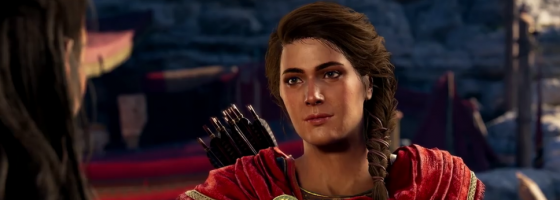Assassin’s Creed Odyssey went under fire lately for their DLC involving the main character being required to get married and have a child. Many people out there were upset about this, just as there were people who didn’t see it as a big deal. For today, I want to talk about how Ubisoft stepped into a trap of their own making, and how this is not the first time a developer has done this.
The Rules at Play:
Videogames are built on a set of rules and constraints defined by the developers. As the consumer, we have an unwritten contract when it comes to playing a videogame. The developer agrees to make the best possible version of the game for us to enjoy, and we agree to the constraints and objectives present. If a game says that we are a bad-ass ninja who goes around killing everyone, expecting a “peaceful resolution” mechanic wouldn’t be right.
Every videogame has rules that affect what we can and can’t do within the gamespace. Player interactivity is born from operating within those rules and deciding options for ourselves, which culminate in a unique experience even if we’re playing the same concept. This is hardly a new concept, it even exists in traditional card games like patience or solitaire. With that said, this is where the idea of player choice comes into play and its impact on the player experience.
The Power of Choice:
Choice in videogames is a major element that has only gotten bigger over time. Any way for the player to customize or personalize their experience has an impact on their enjoyment of the game. Choice can be as small as what hair style options are available, to as vast as letting the player determine the ending of the game.
Choice is something that you cannot take lightly as a developer. As we’ve talked about before, once the player realizes that choice doesn’t matter and the illusion is shattered, you will never be able to get that back. From a gameplay standpoint, if the player learns that their build cannot get through the game, they will most likely quit playing. From a personalization standpoint, players can become upset if you offer personalization options, but they’re not able to represent themselves in the game.
With Assassin’s Creed Odyssey, Ubisoft did the one thing you never do as a developer with choice — you let the player make choices and then take them away.
Love Stinks:
I have not played Odyssey yet and can only go by news outlets, but here is as spoiler-free of a discussion about what happened. The game’s major marketing point was having two defined characters to choose from: a man or a woman to play as. Both characters have their own personality, voice actors, mannerisms, etc.
The player is free to make choices as to how they behave and respond to people — impacting major events, relationships, and so on. The big twist at the end of the last DLC episode, and what has everyone upset, is how the character regardless of your choices decides to marry and have a child.
For people who chose their character to be single, or have same-sex relationships, the game overrides their choice in favor of the narrative.
And that takes us to the double-edged sword of choice in videogames, and where all the extra — or massive — work comes in.
Building Choices:
Choice does not matter if it’s not represented in some way in your game, and as we talked about, it’s even worse if you take away choices the player has made.
For every major decision the player makes in a game, those elements should have ramifications going forward. This is where a lot of the controversy surrounding the Mass Effect trilogy came in. Bioware built up three game’s worth of decisions by the player, and then tried to condense that all down into just three endings.
I know what you’re thinking right now: “Expecting them to cover all the decisions is madness,” but therein lies the difficulty of choice in videogames. The more permutations you introduce to the player, the more work you need to do to include them in the game.
Short-term choices aren’t as important, but if you’re marketing your entire game on “every choice matters,” then people are going to be expecting that.
As we said above, if you override the player’s choices, then not only are you taking away control, but you are retroactively doing it as well.
Choosy Decisions:
Choice in videogames can become a never-ending cycle of gamers always wanting more. In an earlier post, we talked about options from a personalization standpoint. Once you start letting players make decisions, you need to keep that in the back of your mind when designing new content and elements.
With the Assassin’s Creed Odyssey issue, this was something that should have been spotted right away by the designers. It is impossible to give the player complete free will in the game, as we talked about in the Bandersnatch piece, but that doesn’t give you an excuse to retcon choices made by the player.
There is more to talk about when it comes to choices from a customization viewpoint, but we’ll save that for another piece. Once you give the player control over an aspect of a character or story, then it’s up to you to figure out how to move forward without having that element available.



